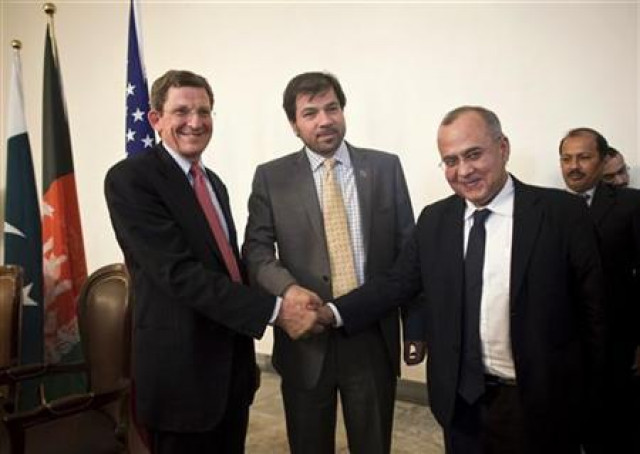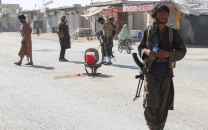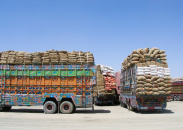Talks or a three-way blame game?
After the Americans leave, things will become tough for Pakistan.

Bashir also emphasised on security in the region, which, one hopes, would mean discussing what all the neighbours, including India, are doing in Afghanistan. The talks must have been overshadowed by Afghan President Hamid Karzai condemning Islamabad for the firing of 470 rockets from Pakistan into Afghanistan over the past three weeks, while Pakistan had complained about cross-border attacks into Upper Dir from Afghanistan when President Karzai was visiting Islamabad earlier. Foreign Secretary Bashir was right, however, in saying what he said. He tacitly accepted that, just as the raiders from Afghanistan included the Pakistani Taliban on the run from Malakand Division, Afghanistan, too, had scant control and knowledge about what the Afghan Taliban and Afghan border security guards were doing on its side of the Durand Line. The meeting was convened to discuss border violations and we hope that some realism permeated the attitudes of the attendees.
An American military commander added his bit to the blame game the same day. He said in Washington that Pakistan was not willing to stop the Haqqani network from attacking Afghanistan from its safe haven in North Waziristan. As if to back the words, the Taliban struck an elite hotel in Kabul, killing at least 10. Such raids are usually blamed on Pakistan and its protégé, the Haqqani network. The meeting also discussed plans for reconciliation with the Taliban but other issues like cross-border violations and safe havens for terrorists must have affected the general ambience. It is not only the Haqqani network the other side complains about, there is also the issue of Hekmatyar’s Hezb-i-Islami attacking the north of Afghanistan from Pakistan. Both are seen as ‘Pakistan cards’ challenging the Karzai-American combine in the eastern and northeastern provinces. The troika is divided three ways. The Americans have never had a moment of reassurance with President Karzai whom many top officials suspect of medicating himself against bipolar disorder, according to Bob Woodward’s book Obama’s Wars. The truth is that he does his ‘blowing hot and cold stuff’ with Pakistan too. He was milk and honey during his visit to Islamabad, spreading the impression that Pakistan and Afghanistan could team up against the US, but he blew his top against Pakistan soon enough after reaching Kabul.
Unfortunately, Pakistan’s diplomacy has to live with a most unrealistic and self-damaging unanimous resolution of the Islamabad parliament. According to it, the Pakistan Army has to make the Americans stop their drone attacks by blocking Nato supplies — something that it can hardly achieve, unless it agrees to the American demand of purging terrorist safe havens inside Pakistan. Like the Karzai government, Islamabad also has issues in some parts of the country regarding the existence of its writ. Furthermore, there is confusion about defending the very elements that kill Pakistani civilians with suicide bombings. The Americans are focused on running away from the region after discovering that Afghanistan is a failed state while Pakistan creeps daily upwards on the list of failed states (compiled by US publications). Pakistan is focused on India and has just finished holding an election in Azad Kashmir that will rev up the ‘efforts’ for the liberation of Indian Kashmir that General Musharraf had so villainously abandoned while General Kayani was his junior. After the Americans leave, things will become tough for Pakistan. It is struggling against the terrorist ‘infection’ within itself after wrongly encouraging the public impression that al Qaeda is, in fact, less dangerous than ‘nuclear-weapons-grabbing’ America. Its economy is winding down because of terrorism, even as it feels happy at being left alone holding the bag against al Qaeda and its affiliated terrorist groups.
Published in The Express Tribune, June 30th, 2011.



















COMMENTS
Comments are moderated and generally will be posted if they are on-topic and not abusive.
For more information, please see our Comments FAQ